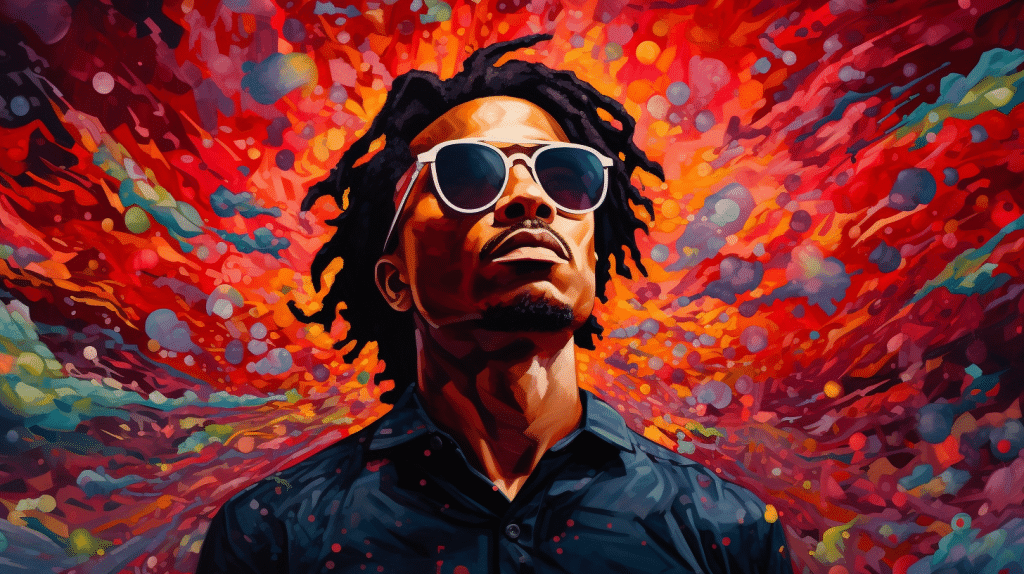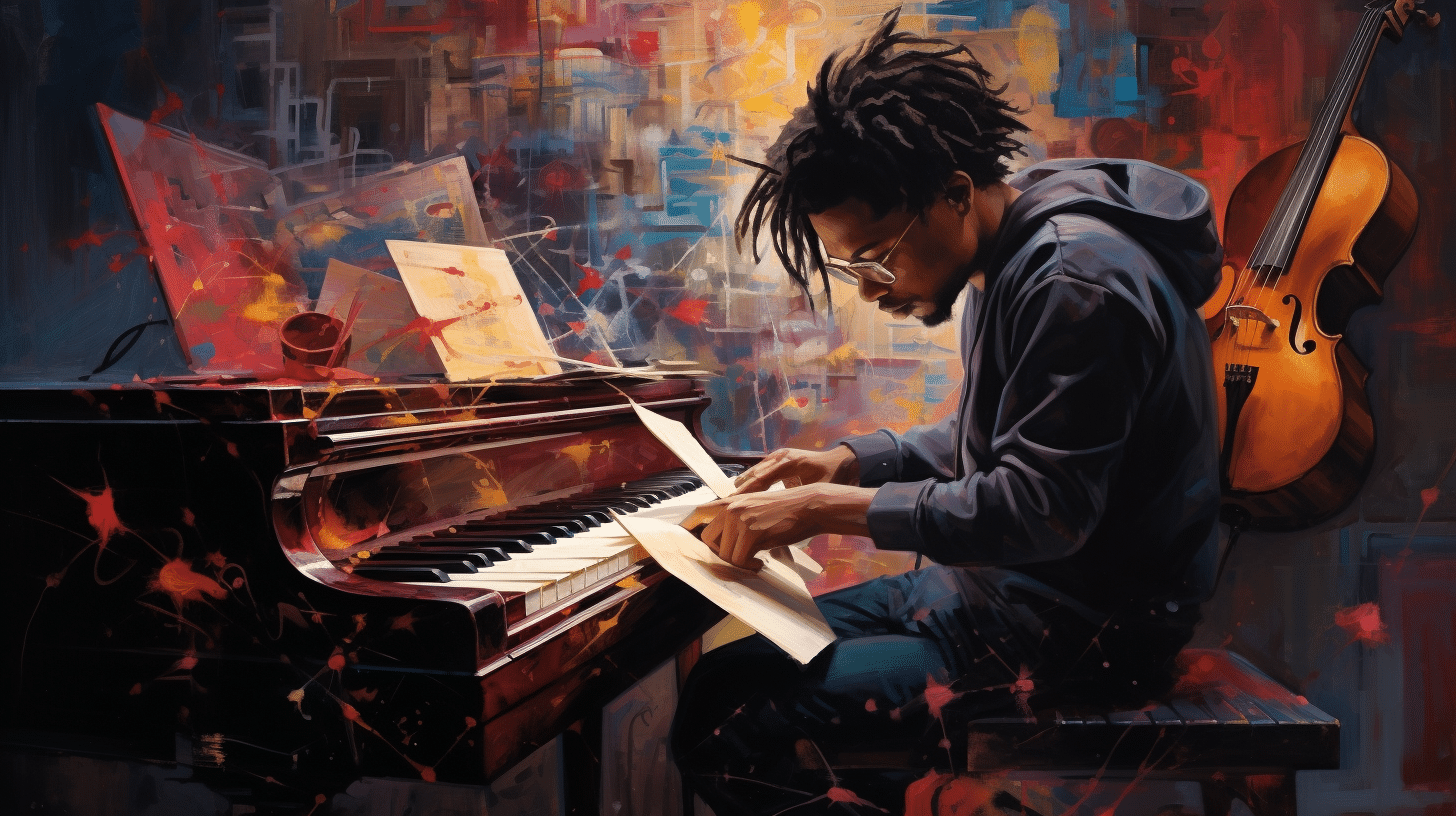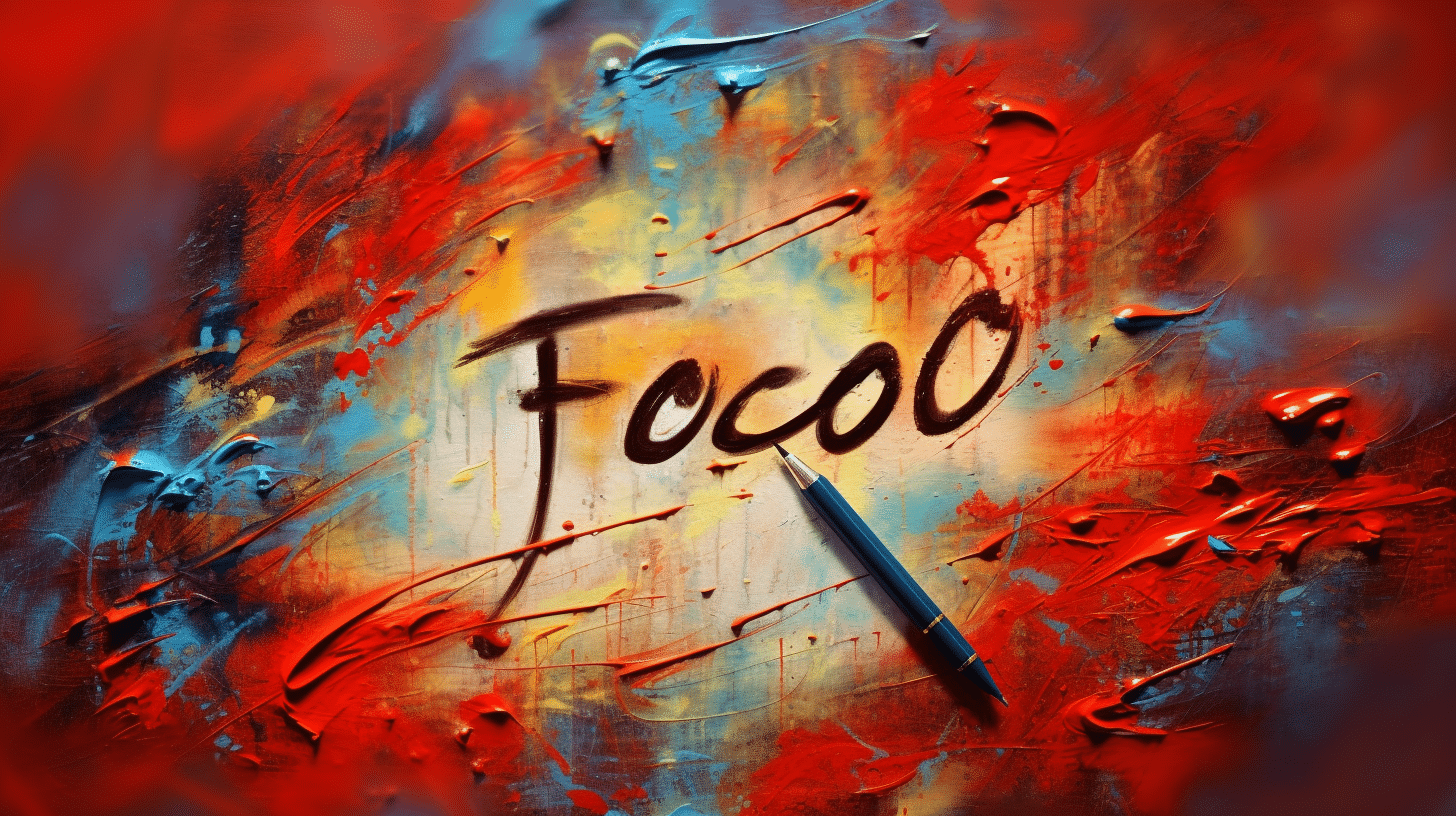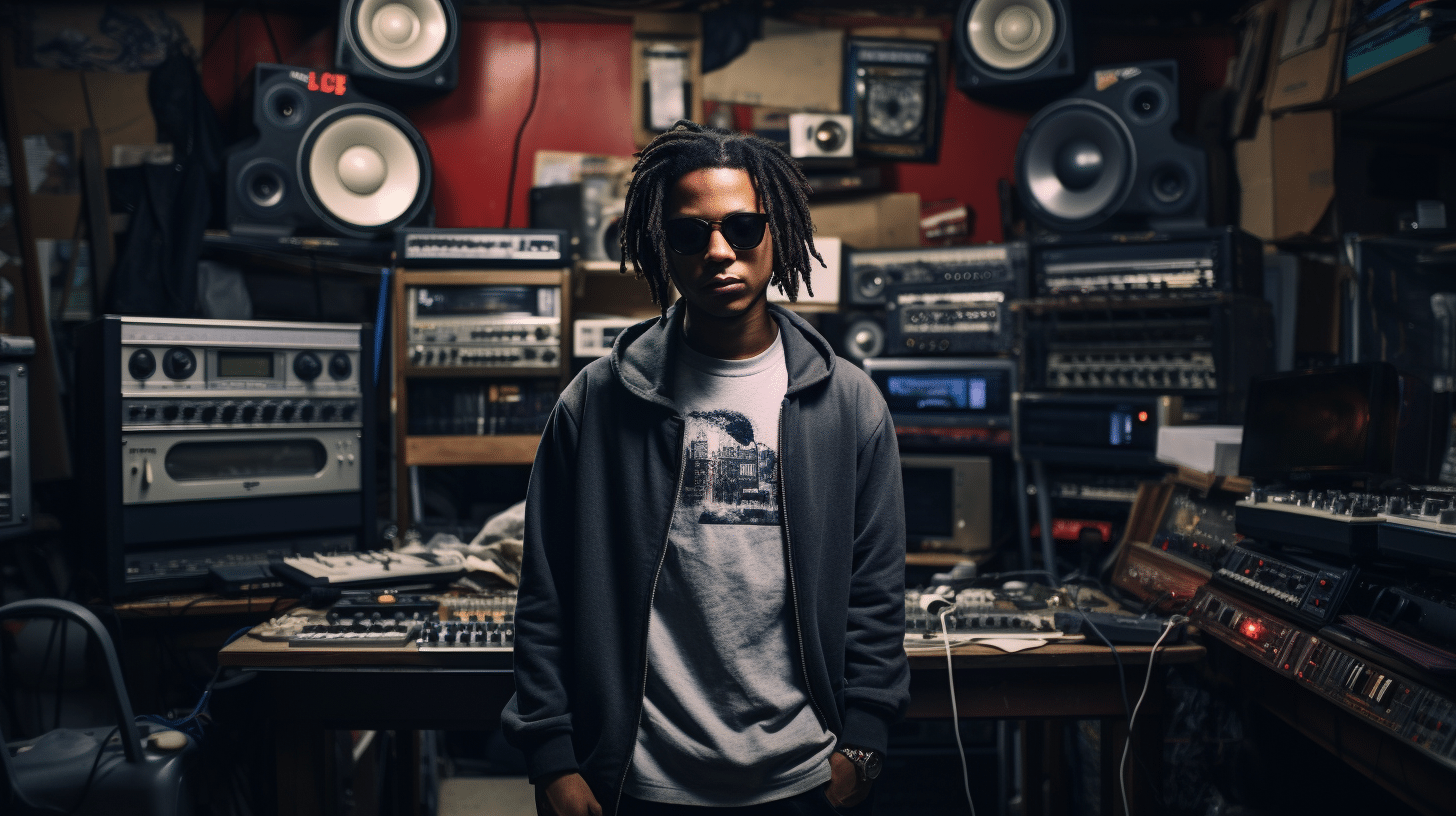Wasalu Muhammad Jaco (born February 16, 1982), better known by his stage name Lupe Fiasco ( LOO-pay), is an American rapper and record producer. He rose to fame in 2006 following the success of his debut album, Lupe Fiasco’s Food & Liquor. He also performs as the frontman of rock band Japanese Cartoon under his real name. As an entrepreneur, Fiasco was the chief executive officer of 1st and 15th Entertainment.
Raised in Chicago, Jaco developed an interest in hip hop after initially disliking the genre for its use of vulgarity and misogyny. After adopting the name Lupe Fiasco and recording songs in his father’s basement, 19-year-old Fiasco joined a group called Da Pak. The group disbanded shortly after its inception, and Fiasco soon met rapper Jay-Z who helped him sign a record deal with Atlantic Records. In September 2006, Fiasco released his debut album Lupe Fiasco’s Food & Liquor on the label, which received three Grammy nominations. He released his second album, Lupe Fiasco’s The Cool, in December 2007. The lead single “Superstar” became his first top 40 hit on the Billboard Hot 100. After a two-year delay, his third album, Lasers, was released in May 2011 to mixed reviews; however, it became his first album to debut at number one on the Billboard 200. The album was preceded by his highest charting single, “The Show Goes On”, which peaked at number 9. His latest album, Drill Music in Zion, was released in June 2022.
In addition to music, Fiasco has pursued other business ventures, including fashion. He runs two clothing lines, Righteous Kung-Fu and Trilly & Truly; he has designed sneakers for Reebok. He has been involved with charitable activities, including the Summit on the Summit expedition, and in 2010 he recorded a benefit single for victims of the 2010 Haiti earthquake. Fiasco is also noted for his anti-establishment views, which he has expressed in both interviews and his music.
What are the details of Lupe Fiasco’s life and career?
What was Lupe Fiasco’s early life like from 1982-1999?
Wasalu Muhammad Jaco, known as Fiasco, was born on February 16, 1982, in Chicago, Illinois. He is of West African heritage and is one of nine children born to Shirley, a chef, and Gregory, an engineer. His father was also a member of the Black Panther Party and was an accomplished African drummer and karate teacher. Additionally, he owned karate schools and army surplus stores.
Raised Muslim in the Madison Terrace housing project on Chicago’s West Side, Fiasco began martial arts training at age three. His parents divorced when he was five years old but his father remained a significant figure in his life. Despite moving to live with his mother after the divorce, Fiasco spent considerable time with his father who exposed him to diverse experiences.
In sixth grade, Fiasco moved in with his father in Harvey, Illinois. His father taught him self-defense techniques against drug dealers as they lived next door to a crack house. Despite this turbulent upbringing, Fiasco credits his well-rounded education to his parents’ emphasis on reading and exposing him to various subjects.
As a teen, he competed in Academic Decathlon contests. He was described by his mother as smart yet complex and somewhat of a loner who always carried books with him. Initially disinterested in hip hop due to its vulgarity; he preferred jazz music idolizing Benny Goodman.
His inability to play an instrument led him into poetry which subsequently sparked an interest in song lyrics. He started rapping his poems in eighth grade and decided to pursue hip-hop after listening Nas’ album “It Was Written” released in 1996.
While attending Thornton Township High School, he befriended gang member Bishop G due to their shared love for music. With permission from Fiasco’s father they recorded mixtapes that gained popularity amongst their schoolmates but were rejected by the larger hip hop community due to their distinct style.
Fiasco’s stage names included Little Lu and Lu tha Underdog before settling for his current moniker. The nickname “Lupe” was an extension of the nickname “Lu” given by his mother. Meanwhile, “Fiasco” is a reference to The Firm song “Firm Fiasco” which he felt looked good in writing. He also felt the name humbled him as it means disaster, which served as a reminder to take time or face the consequences.
How did Lupe Fiasco’s career begin during the period 2000-2005?
At the age of 18, Fiasco began his solo music career in his father’s basement, despite his parents’ reservations about him pursuing rap. He sourced equipment from flea markets and secondhand stores, including an old mixing board, a record player, vinyl records, and mic stands.
At 19 years old, Fiasco joined Da Pak, a group influenced by California gangsta rappers like Spice 1 and Ice Cube. The group signed with Epic Records but only released one single before disbanding. Reflecting on this phase of his career later on, Fiasco admitted feeling hypocritical for rapping about cocaine, guns and women. This led him to leave gangsta rap behind and develop a deeper appreciation for lyricists like Jay Z and Nas.
He also credits his mother for giving him a record of The Watts Prophets – one of the first bands to blend spoken words with music. Despite being without a group for the first time in his career, Fiasco continued to make music independently. One such track was “Could Have Been”, which reflected on possible career paths outside of rap.
Fiasco’s solo work caught the attention of MTV resulting in him signing with Arista Records. However, he was dropped when L.A Reid left the company. During this period he met Jay-Z who likened Fiasco to himself as a young man and helped him secure another deal with Atlantic Records.
While working on his debut album,Fiasco released his mixtape series ‘Fahrenheit 1/15’, gaining popularity via word-of-mouth marketing strategies.He remixed Kanye West’s song “Diamonds from Sierra Leone” into “Conflict Diamonds” raising awareness about conflict diamond trade.
The remix drew West’s attention leading to collaboration between the two artists on West’s “Touch The Sky” which charted on Billboard Hot 100 at number forty-two.From there,Fiasco released “Kick Push”,a love story centered around skateboarding, an unusual theme for hip-hop.This song along with its music video earned Fiasco recognition in the hip-hop community and two Grammy nominations in 2007.
What happened during 2006-2008 with Lupe Fiasco’s Food & Liquor and The Cool?
Jay Z played a key role in the production of Lupe Fiasco’s debut album, “Lupe Fiasco’s Food & Liquor”. The album’s title reflects the common ‘Food and Liquor’ stores in Chicago, with Fiasco interpreting food as growth and progression while viewing liquor as destructive. The album was released on September 19, 2006 with multiple producers such as Jay-Z, Kanye West, Mike Shinoda, and The Neptunes contributing. It resulted in several singles including “Kick, Push” and “I Gotcha”, leading to three Grammy nominations including Best Rap Album. In the same year, Fiasco was named GQ magazine’s “Breakout Man of the Year.”
Fiasco released his second album, “Lupe Fiasco’s The Cool”, in 2007. This concept album builds on a track from his first album. While working on this record, he experienced personal hardship with the death of his father due to type II diabetes and his business partner Charles Patton being sentenced to prison for drug-related charges. His sophomore offering was well received by critics and hailed as one of the best hip-hop albums of that year by The New York Times.
In 2007, it was announced that Fiasco had formed a group called Child Rebel Soldier alongside Kanye West and Pharrell Williams. They released a single titled “US Placers”. Additionally in 2008, Fiasco joined Kanye West’s Glow in the Dark Tour which also featured Rihanna and N.E.R.D., visiting several cities including Chicago. MTV named him the 7th Hottest MC in the Game that same year.
What occurred during 2009-2011 in relation to Lupe Fiasco’s “Lasers”?
In February 2010, at a concert in New Zealand, Fiasco premiered new music from his upcoming album, then titled We Are Lasers. He claimed the album was ready but was waiting for Atlantic Records to set a release date. The label expressed concerns about the lack of commercial singles and suggested songs for Fiasco to record. However, he declined due to non-ownership of these songs. In an explanation, he stated that labels are more interested in hit records than albums.
The delay of the album’s release caused confusion among fans who consequently launched an online petition urging Atlantic Records to release Lasers. The petition attracted significant attention on hip hop blogs and garnered over 16,000 signatures. Touched by this support, Fiasco released “B.M.F-Building Minds Faster” as a thank you to his fans.
During this wait period for Lasers’ release, Fiasco finished another album, Food & Liquor II: The Great American Rap Album. Uncertain about its fate, he still released “Go To Sleep” from it out of desperation to put out new music while also working on various side projects.
One such project was the formation of All City Chess Club in April 2010 with Pharrell, Asher Roth, B.o.B., The Cool Kids and others. They created one track together – a remix of Fiasco’s “I’m Beamin”. On July 16th 2010, he released Japanese Cartoon’s debut EP In The Jaws of the Lords of Death – his rock music side-project.
Two and a half years post-completion finally saw Lasers’ release on March 8th 2011 with its first single being “The Show Goes On”, which sampled Modest Mouse’s “Float On”. This debuted at number 57 on the Billboard Hot 100 and later peaked at number 9.
Lasers’ production team included Alex Da Kidd and Jerry “Wonda” Duplessis among others with featured artists like Skylar Grey, Trey Songz, and John Legend. The album debuted at number one on the Billboard 200 chart, despite mixed reviews, selling 204,000 copies in its first week. It received Grammy nominations for Best Rap Album, Best Rap Performance and Best Rap Song.
Fiasco also lent support to the Occupy Wall Street movement by donating tents and releasing a poem in its favor. He released his mixtape “Friend of the People: I Fight Evil” on Thanksgiving Day.
What is the significance of 2012-2013’s “Food & Liquor II: The Great American Rap Album” in Lupe Fiasco’s career?
Following his work on Food & Liquor 2, Fiasco began a collaborative project with fellow Child Rebel Soldier & All City Chess Club member Pharrell. Before the album launch, he announced that there would be no more mixtapes after “Friend Of The People: I Fight Evil”, which was released prior to Food & Liquor II: The Great American Rap Album. This album was intended to be a double-disc set, with Part I releasing in the fall of 2012. Controversy arose when its lead single, Around My Way (Freedom Ain’t Free), was accused by Pete Rock of using a sample from They Reminisce Over You (T.R.O.Y.).
In 2012, Fiasco collaborated with Australian singer Guy Sebastian on the single “Battle Scars”. Recorded in Sydney during Fiasco’s Supafest visit, the single is also featured on Sebastian’s album Armageddon. Upon its release, the song topped charts in Australia and became Fiasco’s first number one hit. It later made it onto Fiasco’s fourth album and reached multiple chart positions in the U.S., including number one on R&B/Hip-Hop Digital Song Chart.
Food & Liquor II: The Great American Rap Album Pt. 1 was then released on September 25, 2012. Despite originally being planned as a double-disc album, Atlantic Records only allowed for a singular release—a decision that led to positive reviews and a Grammy nomination for Best Rap Album.
Fiasco had plans for a Part 2 release in spring 2013 but canceled this plan in early January of that year. He instead announced that he would focus on releasing another studio album within the same year.
What happened during 2013–2015 with Lupe Fiasco’s ‘Tetsuo & Youth’?
Lupe Fiasco announced on the red carpet of the Grammy Awards, on February 10, 2013, that his fifth studio album would be called Tetsuo & Youth. He has since released songs which are not destined for Tetsuo & Youth, including “Light Blue” and “Jonylah Forever.” After Imogen Heap heard her name in Lupe’s song Form Follows Function, she contacted him via Twitter to express her gratitude. This led to a conversation in which Lupe invited Heap to contribute to his upcoming album. On August 4, 2013, Fiasco unveiled a new song set for release on September 11 named “Peace of Paper/Cup of Jayzus”. The first song from Tetsuo & Youth was revealed as “Crack”, featuring Chris Brown. A tour in support of Tetsuo & Youth was announced on October 3 of the same year with label-mate Stalley as a supporting act and The Boy Illinois as an opener. The album was initially planned for early 2014 but was delayed until 2015. The first track rumored to be from the album is “Old School Love”, featuring Ed Sheeran. Big K.R.I.T. and Rick Ross were also confirmed as contributors to the album. The first promotional single before the reveal of the track list, “Mission”, was launched on May 19, 2014 aimed at empowering those battling cancer and commemorating those who have succumbed to it. Fiasco collaborated with Stand Up To Cancer as an ambassador and together they planned collaborations linked with the track expected to be disclosed within that year. A second promotional single titled “Next to It” featuring Ty Dolla Sign was dropped on June 24th, 2014. Owing to the Ferguson riots in 2014, feuds between Fiasco and fellow rappers Azealia Banks and Kid Cudi emerged on Twitter. The conflict with Kid Cudi escalated and Lupe Fiasco reportedly made threats on MTV. On August 29, 2015, Fiasco surprised fans with a free mixtape named Pharaoh Height comprising six new tracks with Egyptian-themed titles such as “Valleys,” “Kings,” and “Pyramid.”
What were Lupe Fiasco’s projects, Drogas Light and Drogas Wave, during 2016-2018?
In April 2016, Fiasco publicized that he would roll out three final albums (Drogas, Skulls, and Roy), which later evolved to Drogas, Drogas Light, and Skulls. However, in October the same year, he clarified that these albums would not be released between October and January and mentioned that after 2017 he would start producing new music.
On December 12th of 2016, Lupe released a freestyle titled “N.E.R.D”, named after a funk rock duo of the same name and using J. Cole’s “Everybody Dies” instrumental. The track contained controversial lines about Jewish executives robbing artists of their publishing rights. Brian Zisook from DJBooth.net who is Jewish himself criticized this particular line for its potential anti-Semitic connotations.
After SoundCloud took down the song due to alleged hate speech, Lupe perceived this as a divine sign to retire from music indefinitely. He then announced the cancellation of his previously planned albums: Drogas, Drogas Light, and Skulls. Despite this retirement announcement, he later stated that DROGAS light was set to be released on February 10th of 2017 under Thirty Tigers label.
In March 2018 Fiasco premiered a three-part TV documentary titled Beat N Path where he explores China while following his martial arts interest. This documentary serves as an homage to his late father who was a grandmaster and had run a martial arts school in Chicago. The experiences he gained during this journey inspired him to write his next single “Air China”. The documentary was exclusively broadcasted on KIX in Southeast Asia.
Fiasco made an announcement on September 13th of 2018 stating that Drogas Wave will be available starting September 21st of the same year. This album represents the second part of a trilogy followed by Drogas Light and Skulls.
Is Lupe Fiasco Currently Working on Drill Music in Zion from 2022 to the Present?
On June 24, 2022, Fiasco unveiled Drill Music in Zion via 1st & 15th Too and Thirty Tigers. The album was introduced by two singles: “Autoboto” and the title track “Drill Music in Zion”. Fiasco also contributed to Aesop Rock’s song “Pumpkin Seeds”, which was produced by Blockhead and released on December 9, 2022. This song was used as a fundraising initiative for Collaboratory, an entity that supports two local DIY skateparks in Dayton, Ohio. On April 28, 2023, Fiasco teamed up with Chicago-based visual artist SentRock for a new release titled “SentRock”. The track was both written and produced by Fiasco who also incorporated references to the lyrics into a painting crafted by SentRock.
What is Lupe Fiasco’s Artistry Like?
Who are the influences of Lupe Fiasco?
Among the artists who have influenced Jaco are Nas, Jay Z, and Common. He also cites AZ, De La Soul, and N.W.A as sources of inspiration. Additionally, he’s been impacted by the music of Mos Def, Pharrell Williams, A Tribe Called Quest, Q-Tip, Linkin Park and Gang Starr.
What is Lupe Fiasco’s lyrical style?
Lupe Fiasco, along with fellow rappers Common, Mos Def and Talib Kweli, is acknowledged as a trailblazer of conscious hip hop. This genre emphasizes social issues – themes that are prevalent in Fiasco’s album “Food & Liquor,” which discusses topics like absent parenting, terrorism, religion including Islam, warfare, and prostitution. He credits his cultured upbringing for his interest in these issues, describing his mother as an intellectual and his father as a Renaissance man.
Fiasco notably criticizes the misogyny often found in hip hop in his song “Hurt Me Soul”. However, he does not support censorship in music. His stance is that instead of censoring offensive content, efforts should be made to combat illiteracy and poverty.
In terms of technicality, Fiasco uses various lyrical devices when writing songs. Viewing hip-hop as a storytelling platform due to his theater background significantly influences the lyrics. He wrote plays during childhood which impacted how he approaches songwriting now. His work includes both metaphorical and literal narratives aiming for brevity – getting from point A to point B using minimal words. An example is his song “Gotta Eat” from “The Cool”, told from a cheeseburger’s viewpoint tackling poor nutrition within US black communities while continuously referencing drug dealing and hustling metaphorically.
What are Lupe Fiasco’s Philanthropy and Business Ventures?
In 2001, Fiasco established an independent record label named 1st & 15th Entertainment with Charles “Chilly” Patton. The title of the label is a nod to conventional semi-monthly payment dates. Despite his albums being released through Atlantic Records due to contract obligations, majority of his work is typically produced by his own company and its in-house production team. Initially set to take on the role of vice-president, Fiasco stepped into the position of CEO after Patton’s conviction for drug-related charges. He and singer Matthew Santos were among the most recognizable artists signed to the label. However, in November 2009, he decided to dissolve the label.
In March 2013, Fiasco announced via Twitter that he had assumed the role of Creative Director at Higi, a Chicago-based scoring system designed to help individuals improve their self-awareness for enhanced well-being.
In 2005, Fiasco also launched Righteous Kung-Fu – a design company dealing with various products including fashion items, sneakers, toys, video games and graphics for album covers and skateboard decks. It also hosts his own line of fashion called Trilly & Truly. His engagement with skateboarding extends further as he sponsors a team and has endorsements from DGK Skateboards.
Fiasco joined forces with Reebok in January 2006 as part of their “O.G” marketing campaign where popular rap artists like Lil Wayne and Mike Jones designed personalized versions of the Reebok “O.G” model.
In 2009, he took part in The People Speak – a documentary film featuring musical renditions of letters, diaries and speeches from ordinary Americans based on historian Howard Zinn’s book A People’s History of the United States.
On January 7th, 2010 Fiasco embarked on an expedition up Mount Kilimanjaro along with musician Kenna and actress Jessica Biel amongst others as part of the Summit on the Summit initiative to raise awareness about the global lack of clean drinking water.
In response to the 2010 Haiti earthquake, Fiasco released a track with Kenna named “Resurrection” as part of a compilation from charity Music for Relief, aiming to stimulate donations for disaster relief and recovery efforts.
From 2020 till 2023, Fiasco has served as a visiting scholar and artist at Massachusetts Institute of Technology, often collaborating with Professor of Digital Media Nick Montfort.
What is known about Lupe Fiasco’s personal life?
What is Lupe Fiasco’s involvement in Gaming?
Lupe Fiasco is a passionate video game enthusiast, particularly fond of the Street Fighter fighting game series. In an unexpected turn of events in 2016, he triumphed over professional player Daigo Umehara in an exhibition match of Street Fighter V. He achieved victory with a score of 3–2 using the character Ken.
What is the Connection Between Lupe Fiasco and Martial Arts?
In a 2008 methodshop interview, Lupe Fiasco divulged that he possesses “a black belt in karate, two black belts in the styles of samurai sword fighting, kendo and aido” along with “the equivalent of a black belt in Chinese wushu.” His passion for Martial Arts is evident from the fact that he named one of his businesses “Righteous Kung-Fu,” which deals with fashion design, sneakers, toys, video games, comic books and other items. He also once stated on Facebook that his family has been immersed in martial arts for three generations and runs five karate schools in Chicago.
What is Lupe Fiasco’s Perspective on Religion?
Lupe Fiasco has openly identified as a Muslim in various interviews, including on MTV’s Rap Fix. He believes Islam significantly influences his life and work, but he prefers to keep his religious beliefs private so as not to be perceived as a representative of Islam. In order to avoid any critique of his personal flaws being misconstrued as flaws of the religion itself, he refrains from flaunting his faith publicly. His mixtape series Fahrenheit 1/15 includes a remix of Kanye West’s “Jesus Walks”, renamed “Muhammad Walks”, which gained considerable popularity within the Muslim community. In tracks like “Hurt Me Soul”, “Little Weapon”, “Hi-Definition”, and both the intro and outro tracks of Lupe Fiasco’s Food & Liquor, he can be heard incorporating Islamic recitations. Lupe Fiasco has also expressed support for the notion that Islam will eventually become a global religion.
What are Lupe Fiasco’s political views?
In a conversation with Stephen Colbert on the comedic news program, The Colbert Report, Lupe Fiasco expressed his political philosophy: “One should criticize power even if in agreement with it.” He further delved into the political undertones of his music during a June 2011 interview on CBS’s What’s Trending. Fiasco pointed out that he sees the United States and Obama as significant contributors to global terrorism due to their foreign policies. He noted that these policies often provoke individuals in other countries to embrace terrorism. He also criticized Obama’s approach towards the Israeli-Palestinian conflict.
Fiasco disclosed that he only started participating in U.S. elections from 2018 onward, influenced by Donald Trump’s racial views and generally supports Democratic candidates. During Obama’s second presidential inauguration on January 20, 2013, security removed him from the stage for declining to proceed onto another song after performing an extended 30-minute version of “Words I Never Said”, a track containing anti-Obama lyrics, in Washington D.C.. Lastly, in June 2015, Fiasco penned an open letter addressing white supremacy.
What is Lupe Fiasco’s Connection to Visual Arts?
Fiasco, known for creating the artwork for Tetsuo & Youth, Drogas Wave and Drill Music In Zion, has openly expressed his passion for visual arts. Through interviews and his well-known Instagram Lives, he’s shared his specific interests in photography, acrylic painting, chiaroscuro and pencil drawing. He revealed on October 11, 2020 via his official Instagram account that he had hosted his first art exhibition at SOHO House Chicago. Then on October 15, 2022 Fiasco posted images on Twitter hinting at an upcoming graphic novel based on the Atlantic Slave Trade named Longchains.
What is Lupe Fiasco’s discography?
The body of work by Lupe Fiasco is extensive and includes many critically acclaimed albums. In 2006, he released “Food & Liquor,” which was his debut studio album. This was followed up in 2007 with “The Cool.” After a four-year gap, he came out with “Lasers” in 2011. The subsequent year, Fiasco released “Food & Liquor II: The Great American Rap Album Pt. 1”. In 2015, fans were treated to “Tetsuo & Youth”. Two years later, in 2017, he dropped “Drogas Light”, which was then succeeded by “Drogas Wave” in 2018. His latest release as of now is called “Drill Music in Zion,” which came out in 2022.
What Awards Has Lupe Fiasco Received?
In 2006, Lupe received the honor of being one of GQ’s Men of the Year. He also won a Grammy in 2008, in addition to receiving 12 nominations. Furthermore, he has been a contender for several other awards throughout his career. In recognition of his work as a musician, USA awarded him the Character Approved Award in 2009.
What further reading is available on Lupe Fiasco?
The article titled “Biography Today – Lupe Fiasco (2009)” was published by Omnigraphics, located in Detroit, Michigan. The book carries the ISBN number 978-0-7808-1052-5.







